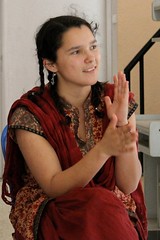Maria Millan
Last week we visited the Association of People with Disabilities (APD)in Bangalore. This is a social venture that provides vocational and educational training to under served people with physical disabilities: people with visual or hearing impairments, motor limitations and learning impairments.
APD assists its population emotionally, socially and intellectually, empowering them to enter main stream education and the work force as computer scientists, horticulturists, physical therapists or teachers. As we headed out to the next social enterprise I was thinking of my study abroad experience in Bihar last year, where I was stopped by at least 10 beggars while making my way to the market only 3 blocks away. I remember an old woman who frowned at me while insistingly pointing at the sick chicken she was carrying in her arms wrapped up in a shawl. I didn’t understand whether she was asking for food or money and whether it was for the chicken or herself.
I remember children lined up along the gates of a temple, taking their fingers to their mouths begging for food and money. I remember men dragging their bodies across the sidewalks, seeming contortionists with all sorts of spinal deformations and missing limbs. Little by little I became immune to these people living outside the reach of my defense walls. I didn’t know how to help, and while I tried frowning back to the old women with a smile on my face, rustling the children’s hair and playfully asking them for money and food, I became immune to the context to the extent that beggars became part of the Indian scenery, something I could interact with or ignore. 
What I found amazing about visiting APD was being reminded of the people that recognize social problems as problems as opposed to simply seeing them as a social phenomena to be reconciled with. I wonder whether shock or understanding motivates people toward change. Perhaps I reduced beggars to part of the Indian scenery because I didn’t understand the social factors at play: I was exposed to poverty as a norm rather than an exception and that very shock was blind to the understanding necessary to use it. But suppose I now know that there are resources and alternatives for under served populations–that there are government and private initiatives that focus on social change–how does that alter my interaction with the Bangalore boy that begs for money and ice-cream outside of the commercial center?
I still ruffle his hair, make faces and pester him back for money and ice-cream. Ultimately I interact with the boy and not the social context that he represents. But perhaps being a social entrepreneur requires us to interact with the boy without loosing touch of the context from which he emerged: knowing that that context can be changed for the better.
What I am beginning to sense is that change requires more familiarity than shock. This means I could be a better resource at home than abroad. I’ll keep thinking about it.






